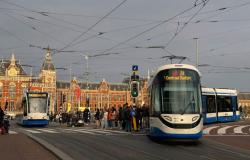To the Turkish voter, he has sent a clear signal to President Recep Tayyip Erdogan and his AKP in the local elections. That party is no longer the largest in Turkey. How did that happen? And what does that mean for the country?
De AKP van Erdogan haalde zijn slechtste resultaat in 22 jaar. En voor het eerst moet de partij landelijk genoegen nemen met een plek achter oppositiepartij CHP. Dat laat zien dat er zondag historische lokale verkiezingen zijn geweest.
CHP kwam als grote winnaar uit de bus. De partij behaalde zijn beste resultaat sinds 1977. De sociaaldemocraten zijn traditiegetrouw sterk in de Turkse kustprovincies, maar na zondag is ook een groot deel van het binnenland rood gekleurd.
Maar de komende vier jaar zitten Erdogan en zijn regering nog gewoon in het zadel. Pas in 2028 zijn er weer landelijke verkiezingen voor parlement en president. De andere kant van de medaille is dat na het resultaat van zondag zo’n 65 procent van de Turkse bevolking te maken krijgt met lokale bestuurders van oppositiepartij CHP.
NU.nl sprak voor dit artikel met de volgende experts:
- Berk Esen – adjunct-hoogleraar politieke wetenschappen en internationale betrekkingen aan de Turkse Sabanci-universiteit.
- Selim Koru – analist bij de Economic Policy Research Foundation of Turkey (TEPAV) en fellow bij de Foreign Policy Research Institute (FPRI).
- Sinan Ülgen – oud-diplomaat en senior fellow bij de Europese tak van denktank Carnegie.
‘Opposition candidates have broad support’
There are a number of explanations for the election results. Such as the popularity of many sitting opposition mayors, the problems with sky-high inflation, a lower turnout of Erdogan’s supporters and the popularity of the ultra-conservative YRP as an alternative to dissatisfied AKP voters.
In Istanbul and Ankara, the incumbent CHP mayors were re-elected with 51 and 60.3 percent respectively. “That shows that opposition candidates can count on broad support among residents,” says Sinan Ülgen.
The result in Istanbul is particularly special. There, several opposition parties deliberately decided to support one opposition candidate in the previous elections in 2019: Ekrem Imamoglu. The plan worked. This year there were alternatives: from Kurdish candidates to right-wing nationalist opponents. Imamoglu won again despite competition.
“He really did it on his own,” says Ülgen. “This will allow him to prepare himself for the position of presidential candidate in 2028. Local elections are a good indicator of the mood among the population.”
Imamoglu also seems aware of this. In his victory speech, he said that the election result shows that democracy is resilient, even in countries with an authoritarian regime. “The breakdown of democracy ends here,” said the re-elected mayor.
Berk Esen adds that, unlike the past five years, Imamoglu now also has a majority in the municipal council and can therefore govern without opposition. “He can now work much more effectively and show what he and his party have to offer.”
Lower turnout and the economy are bothering Erdogan
It does not appear that many AKP voters have defected to the opposition camp. The first signals are that turnout among Erdogan’s supporters was lower than five years ago, while the opposition managed to mobilize slightly more voters.
AKP voters staying home is seen as a silent protest against the economic situation in Turkey. The country has been suffering from sky-high inflation for almost 2.5 years due to mismanagement.
Pensioners in particular are angry because this group has not yet had an inflation adjustment. Pensioners are an important group of voters for Erdogan and his party. In addition, the AKP traditionally has a lot of support among voters with only a primary education and a low income. It is precisely this group that is particularly affected by the economic headwind.
Turks celebrate CHP victory after Erdogan’s party defeat
Dissatisfied Erdogan supporters have an alternative
The results of last year’s national elections show that dissatisfied voters do not simply defect to the opposition camp. Not even when things are (economically) bad. But now there was an alternative in the form of the YRP.
“In national elections, there is a lot at stake and splinter parties such as the YRP often have little chance. But in local elections this is different and small parties can more clearly stand out against the big players,” Selim Koru explains.
The YRP did this successfully, because after Sunday it is the third party in the country. Party leader Fatih Erbakan said his party’s success was a signal to those who have gone astray.
Erdogan showed guilt on Sunday and said that the voter had issued a strong warning. He spoke of a turning point for his party. Erdogan wants to spend the next four years fixing his mistakes. “We have achieved a lot and we hope to achieve much more. God willing, we will continue to win,” the president said.
Om een vraag te kunnen stellen dien je in te loggen. Log in of maak binnen 1 minuut jouw gratis account aan.
Direct inloggen
Gratis account aanmaken
Tags: Turkey turns opposition red consequences Erdogans loss







